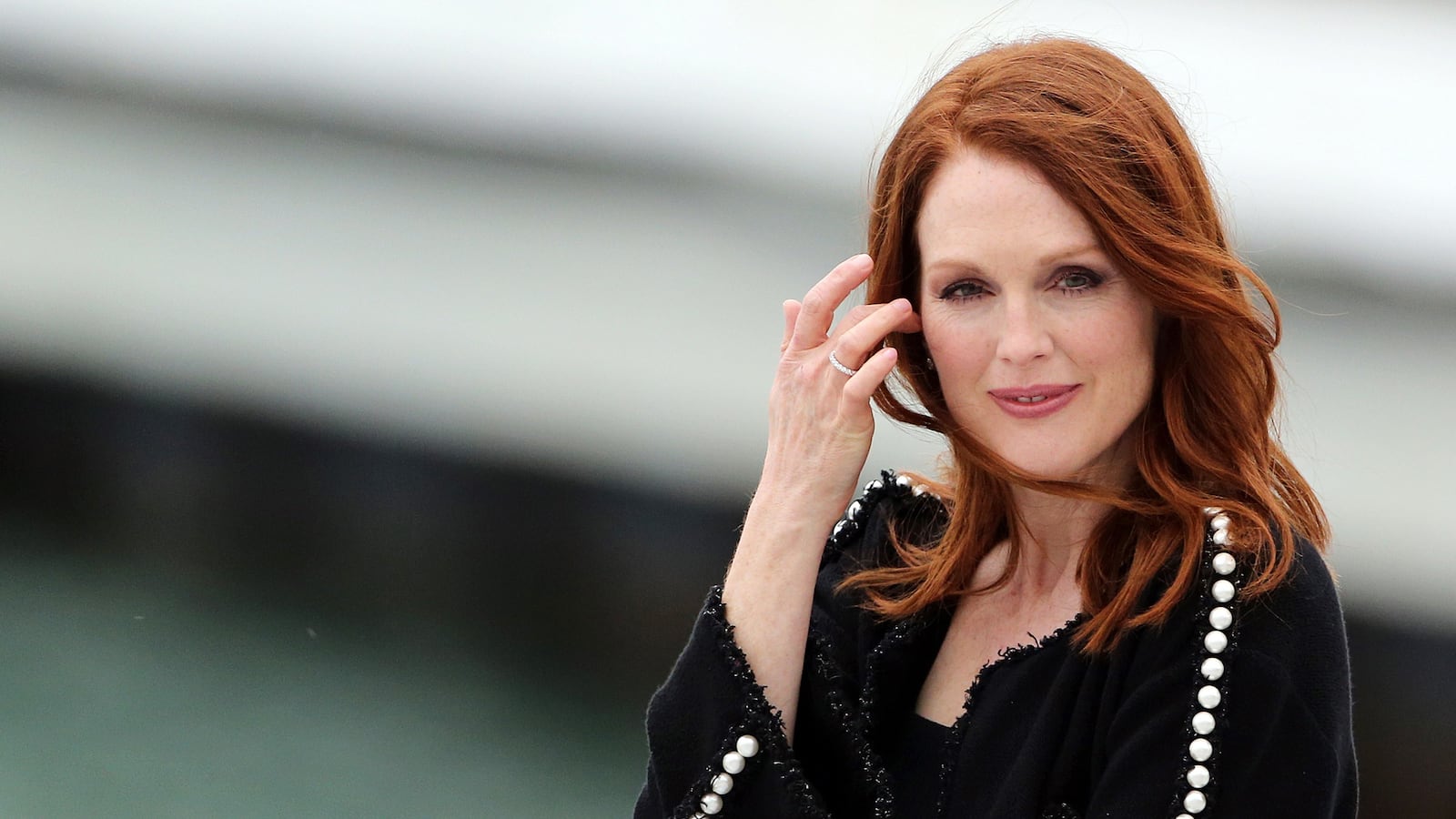Ever since baring her soul (and body) in Short Cuts, Robert Altman’s penetrating study of death and deceit in Los Angeles, Julianne Moore has transfixed audiences with her portrayals of aggrieved women.
There was Carol White, a ho-hum homemaker who finds herself besieged by multiple chemical sensitivity in Safe. Amber Waves, a cocaine-huffing hippie who struggles to balance motherhood and the porn lifestyle in Boogie Nights. And her devastating turn as Far From Heaven’s Cathy Whitaker, a suburban housewife in the 1950s whose idyllic world comes crashing down when she discovers that her husband is gay.
“I’m very attracted to the idea of people having a profound journey, and being able to illustrate that journey from the inside,” says Moore. “We primarily are the narrators of our own existence.”
Truth be told, there is no one better at capturing the agony and alarm of a woman in the throes of a nervous breakdown than Moore. So it comes as a bit of a surprise that the character awards pundits say will bring her a long overdue Oscar statuette is her most understated one yet.
In Richard Glatzer and Wash Westmoreland’s Still Alice, Moore plays Dr. Alice Howland, a brilliant linguistics professor at Columbia University who slowly begins to lose her faculties after being diagnosed with early onset Alzheimer’s disease. What begins as flubbed lines in lectures and forgotten keys soon devolves into forgetting her youngest daughter’s face. And through her remarkably restrained performance, Moore brings us inside Alice’s spotted mind, allowing us to feel the mental frailty of an Alzheimer’s victim.
“There’s a sense of helplessness,” Moore says. “You don’t have any control, and this is someone who’s had control over herself and her choices her entire life. Suddenly, when you’re in the throes of a degenerative disease like this, that all goes out the window.”
After signing on to the film, Moore enlisted the services of her 30 Rock costar Alec Baldwin to play her caring husband. Then, right before last Christmas, she spent four months completely immersing herself in the role. Moore rented every Alzheimer’s documentary she could get her hands on; met with the head of the Alzheimer’s Association, who then set her up with women across the country who had been diagnosed with early-onset Alzheimer’s—the youngest of which was 45; visited Mount Sinai and met with their leading Alzheimer’s researcher, Dr. Mary Sano; subjected herself to a cognitive test; met with the New York Alzheimer’s Association and attended support groups for women stricken by the disease; and went to a long-term care facility where she conversed with patients and family members.

“I didn’t feel it was going to be possible for me to do the work I needed to do on this without trying to understand the disease inside and out,” she says.
Unfortunately, Moore was tied up shooting The Hunger Games: Mockingjay films back-to-back in Atlanta, where she plays rebel leader Alma Coin, so the producers granted her a sabbatical to shoot Still Alice. She flew to New York in March and shot it in just three weeks.
While Moore is very fortunate to not have Alzheimer’s affect anyone in her own family, she says she has struggled with loss when her mother Anne, a psychologist and social worker, passed away recently. “When you lose a loved one, that’s the ultimate loss,” she says. “I lost my mother five years ago… she was only 68, so that was pretty awful.” Moore gets a bit choked up, and doesn’t wish to elaborate further.
At 54, the fiery-haired actress is something of an anomaly in ageist, sexist Hollywood in that her opportunities are just as rich as they were in her younger days—something she says she’s very fortunate for. When asked about the dearth of complex roles for women in Tinseltown, Moore is quick to point out the work of her female peers whom she feels aren’t getting the awards kudos they deserve this year.
“When you look around, look at Gugu Mbatha-Raw and how brilliant she is in Belle and Beyond the Lights, Mia Wasikowska who’s in Tracks, which people haven’t talked about a lot, and Tilda Swinton in Only Lovers Left Alive,” says Moore. “These performances by women are out there, but they’re in smaller movies without a lot of power behind them. So, I don’t think the actresses aren’t there, and I sometimes think that the roles are there, too—but they’re not always acknowledged.”
As far as finally being acknowledged herself with that elusive Academy gold, well, Moore says she would not take it for granted.
“Oh, are you kidding? I would be thrilled,” she says. “It’s a huge accolade.” She pauses. “I feel terribly fortunate in the work I’ve been able to find because I know people who are tremendously talented who haven’t had the same good fortune I’ve had. And I do feel lucky to be in a profession where I can hopefully work ‘til I drop dead.”






